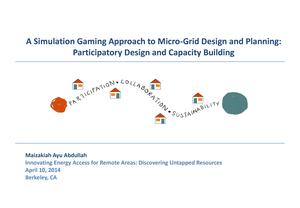Difference between revisions of "A Simulation Gaming Approach to Micro-Grid Design and Planning: Participatory Design and Capacity Building"
From energypedia
***** (***** | *****) m |
***** (***** | *****) m |
||
| Line 2: | Line 2: | ||
[[File:MES Berkley small.png|center|800px|Innovating Energy Access for Remote Areas: Discovering Untapped Resources|alt=Innovating Energy Access for Remote Areas: Discovering Untapped Resources|link=Innovating Energy Access for Remote Areas: Discovering Untapped Resources]] | [[File:MES Berkley small.png|center|800px|Innovating Energy Access for Remote Areas: Discovering Untapped Resources|alt=Innovating Energy Access for Remote Areas: Discovering Untapped Resources|link=Innovating Energy Access for Remote Areas: Discovering Untapped Resources]] | ||
| − | {| cellspacing="3" cellpadding="0" border="0" align="center | + | {| style="font-size: 14px; width: 805px" cellspacing="3" cellpadding="0" border="0" align="center" |
|- | |- | ||
| style="width: 175px; text-align: center; vertical-align: middle; background-color: rgb(139, 45, 45)" | [[File:MES About Icon.png|center|100px|alt=About the International DAAD-Alumni Summer School, Sustainable Provision of Rural RE|link=Innovating Energy Access for Remote Areas: Discovering Untapped Resources#About]] | | style="width: 175px; text-align: center; vertical-align: middle; background-color: rgb(139, 45, 45)" | [[File:MES About Icon.png|center|100px|alt=About the International DAAD-Alumni Summer School, Sustainable Provision of Rural RE|link=Innovating Energy Access for Remote Areas: Discovering Untapped Resources#About]] | ||
| Line 22: | Line 22: | ||
== Overview == | == Overview == | ||
| − | {| cellspacing="3" cellpadding="5" border="0 | + | {| style="width: 800px" cellspacing="3" cellpadding="5" border="0" |
|- | |- | ||
| Existing micro-grid design and planning approaches tend to emphasize techno-economic assessments and lack community engagement, necessary for effective planning and implementation. New approaches must be employed to not only include significant social impacts of micro-grids beyond technical components, but prioritize human development objectives, participation and capacity building. A simulation gaming approach to micro-grid design provides an innovative, participatory tool and process that incorporates social, organizational, technical and financial factors for improved design and planning. Additionally, the approach represents an experiential learning and capacity building exercise that teaches shared resource management and collaborative decision-making<ref>A Simulation Gaming Approach to Micro-Grid Design and Planning: Participatory Design and Capacity Building. Maizakiah Ayu Abdullah and Scott Kennedy.</ref>. | | Existing micro-grid design and planning approaches tend to emphasize techno-economic assessments and lack community engagement, necessary for effective planning and implementation. New approaches must be employed to not only include significant social impacts of micro-grids beyond technical components, but prioritize human development objectives, participation and capacity building. A simulation gaming approach to micro-grid design provides an innovative, participatory tool and process that incorporates social, organizational, technical and financial factors for improved design and planning. Additionally, the approach represents an experiential learning and capacity building exercise that teaches shared resource management and collaborative decision-making<ref>A Simulation Gaming Approach to Micro-Grid Design and Planning: Participatory Design and Capacity Building. Maizakiah Ayu Abdullah and Scott Kennedy.</ref>. | ||
| Line 58: | Line 58: | ||
<references /><br/>__NOEDITSECTION__ __NOTOC__ __NOTITLE__ | <references /><br/>__NOEDITSECTION__ __NOTOC__ __NOTITLE__ | ||
| + | [[Category:Mini-grid]] | ||
| + | [[Category:Digitalisation]] | ||
| + | [[Category:Capacity_Development]] | ||
| + | [[Category:Micro-grid]] | ||
[[Category:Conference_Documentation]] | [[Category:Conference_Documentation]] | ||
| − | |||
| − | |||
| − | |||
Latest revision as of 07:25, 3 September 2019
A Simulation Gaming Approach to Micro-Grid Design and Planning: Participatory Design and Capacity Building
Presenter: Maizakiah Ayu Abdullah
Rapporteur: Carmen Iten
Overview
| Existing micro-grid design and planning approaches tend to emphasize techno-economic assessments and lack community engagement, necessary for effective planning and implementation. New approaches must be employed to not only include significant social impacts of micro-grids beyond technical components, but prioritize human development objectives, participation and capacity building. A simulation gaming approach to micro-grid design provides an innovative, participatory tool and process that incorporates social, organizational, technical and financial factors for improved design and planning. Additionally, the approach represents an experiential learning and capacity building exercise that teaches shared resource management and collaborative decision-making[1]. |
Issues Presented
► Please see the presentation.
- How do we produce human impact rather than only electrification?
- Most community involvement required at feasibility study and design stage.
- Games for change movement: Design of a game to increase community involvement. People can choose their applications and pricing can be discussed as well. The system facilitator is very important.
- First trial in a workshop with young professionals and university students. In the first round they went over the limit 5 times. The reaction was to first blaming each other to use too much energy. Then they agreed on a maximum capacity per household and it worked for the next two rounds (-> educational effet)
- Trial run where they gave certain roles to people in the group (community leader etc)
- A simpler device and/or physical version for people who are not used to digital technology is in planning.
Q & A
1. Planned further studies: Test the game in the planning phase of a new microgrid and run the game in a community that already has a microgrid (how well does it match?)
2. How would the physical version look like?
- Bucket of sand as simulation of electricity that can be used and runs out.
- Develop a version of the game for a tablet. It would be published in 1-2 years as open software.
References
- ↑ A Simulation Gaming Approach to Micro-Grid Design and Planning: Participatory Design and Capacity Building. Maizakiah Ayu Abdullah and Scott Kennedy.





















